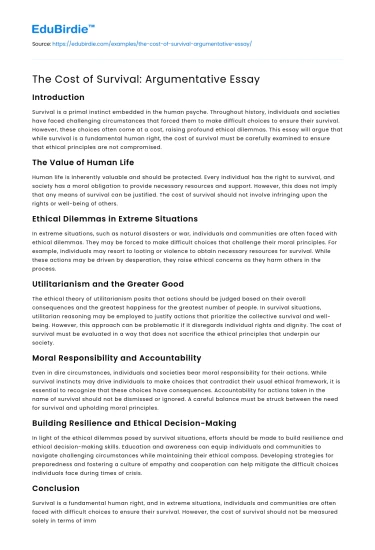Introduction
Survival is a primal instinct embedded in the human psyche. Throughout history, individuals and societies have faced challenging circumstances that forced them to make difficult choices to ensure their survival. However, these choices often come at a cost, raising profound ethical dilemmas. This essay will argue that while survival is a fundamental human right, the cost of survival must be carefully examined to ensure that ethical principles are not compromised.
The Value of Human Life
Human life is inherently valuable and should be protected. Every individual has the right to survival, and society has a moral obligation to provide necessary resources and support. However, this does not imply that any means of survival can be justified. The cost of survival should not involve infringing upon the rights or well-being of others.
Save your time!
We can take care of your essay
- Proper editing and formatting
- Free revision, title page, and bibliography
- Flexible prices and money-back guarantee
Ethical Dilemmas in Extreme Situations
In extreme situations, such as natural disasters or war, individuals and communities are often faced with ethical dilemmas. They may be forced to make difficult choices that challenge their moral principles. For example, individuals may resort to looting or violence to obtain necessary resources for survival. While these actions may be driven by desperation, they raise ethical concerns as they harm others in the process.
Utilitarianism and the Greater Good
The ethical theory of utilitarianism posits that actions should be judged based on their overall consequences and the greatest happiness for the greatest number of people. In survival situations, utilitarian reasoning may be employed to justify actions that prioritize the collective survival and well-being. However, this approach can be problematic if it disregards individual rights and dignity. The cost of survival must be evaluated in a way that does not sacrifice the ethical principles that underpin our society.
Moral Responsibility and Accountability
Even in dire circumstances, individuals and societies bear moral responsibility for their actions. While survival instincts may drive individuals to make choices that contradict their usual ethical framework, it is essential to recognize that these choices have consequences. Accountability for actions taken in the name of survival should not be dismissed or ignored. A careful balance must be struck between the need for survival and upholding moral principles.
Building Resilience and Ethical Decision-Making
In light of the ethical dilemmas posed by survival situations, efforts should be made to build resilience and ethical decision-making skills. Education and awareness can equip individuals and communities to navigate challenging circumstances while maintaining their ethical compass. Developing strategies for preparedness and fostering a culture of empathy and cooperation can help mitigate the difficult choices individuals face during times of crisis.
Conclusion
Survival is a fundamental human right, and in extreme situations, individuals and communities are often faced with difficult choices to ensure their survival. However, the cost of survival should not be measured solely in terms of immediate physical needs. Ethical considerations must be at the forefront of decision-making processes to avoid compromising fundamental principles of justice and human rights. By recognizing the value of human life, exploring ethical dilemmas, and promoting resilience and ethical decision-making, we can strike a balance that upholds both survival and our shared moral obligations. It is through this careful consideration and conscientious action that we can navigate the complexities of survival while preserving our ethical integrity.






 Stuck on your essay?
Stuck on your essay?

